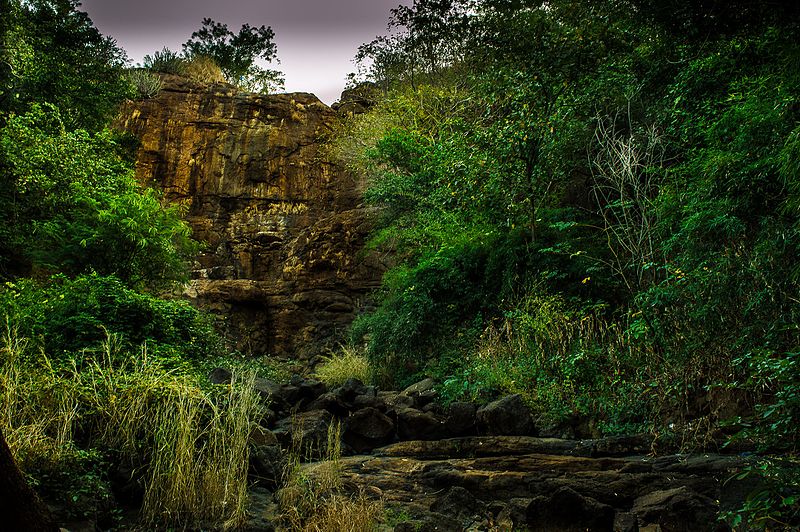Alas, Poor Yuqui
Evelyn Mackenzie, American Renaissance, July 1992

Amazon Jungle
With each passing year more and more of the ancient Amazon forests are lost to slash and burn farmers, loggers, and miners. While this destruction endangers many species that depend on the forest for survival, it also yields surprises in the form of hitherto unknown creatures that have lived for centuries unmolested by the world beyond the jungle’s edge.
Among the more recent specimens unearthed from the heart of the Bolivian Amazon are the Yuqui. This discovery has been catalogued by neither botanist nor zoologist, for the Yuqui falls to the lot of the anthropologist. However, an article in the New York Times Magazine (Feb. 23, 1992) on these “accidents of history” suggests that the Yuqui might be more fitting subjects for the paleontologist.
Indeed, the Yuqui have far more in common with our pre-historic ancestors than with anyone walking the earth today. The Times introduces us to a band of two dozen or so Yuquis and their leader Ataiba (Yuqui for “anteater’s arm”) who were the third group coaxed from the forest by evangelical missionaries, in Dec. 1989 (the entire known population of Yuqui now stands at around 150).
Ataiba and his people believed themselves to be the only humans in existence and had never ventured out of the forest. Not surprisingly, the Yuqui word for “world” is the same as that for “leaves.” They spent their entire nomadic existence foraging for food or hunting small animals with bows and arrows — their only tools. Like homo erectus, who roamed the planet 1,000,000 to 500,000 years ago, the Yuqui carried glowing embers from place to place; they did not know how to make fire. That skill became common some 75,000 years ago, when Neanderthal man displaced homo erectus.
Fire-making is not the only way in which the Neanderthals outstripped the Yuqui. Neanderthals buried their dead, and their graves contain the remains of sick and old people, who could have survived only with the help of other tribesmen. The Yuquis left their sick and old behind to die and covered their dead with leaves.
Yuquis built no homes, but sheltered under palm fronds when it rained. They had no written language, no agriculture, no pottery, no metal smelting, no art, no domestic animals, no wheel. They wore no clothes. They were primitive even by stone-age standards. Nor did the Yuqui have an oral tradition. They had no history and they told no stories. It is hard to imagine a human being who has nothing to tell his children. The Yuqui did have slavery, though, and whenever a high-ranking Yuqui died, a slave was strangled to accompany the master’s spirit into the leaves.
The list of Yuqui non-achievements is a long one. However, as all readers of AR know, in this age, no people are born inferior, nor do they achieve inferiority; instead it is always thrust upon them” by the white man.
According to Allyn Stearman, an anthropology professor at the University of Central Florida, the Yuqui are not living fossils, but victims of the Spanish Conquest. Before the Spanish arrived, the Yuqui were part of an advanced, agricultural society, but were forced to flee into the jungle during the 16th Century to escape from Catholic missionaries. Where Prof. Stearman gets his information is not clear, since the Yuqui certainly cannot enlighten him, but he explains that after their escape from the clutches of Christianity the Yuqui “forgot” everything they had known.
Prof. Stearman argues that the Yuqui “lost” their spiritual leaders and healers, their knowledge of planting and pottery and fire. They also “forgot” all their arts, how to wear clothes, how to count, and despite the fact that they live in a land of many rivers, they forgot how to swim.
The Yuqui have now been settled in a missionary village, where white people are trying to jog their memories. Undoing 400 years of white wickedness may be a daunting task, but it pales in comparison with the prospect of turning a people with an achievement level somewhere between Homo Erectus and Neanderthal Man into productive 20th century citizens.
Although the Yuqui have never before planted or even stored food, the Inter-American Development Bank has set aside $240,000 to help make yeoman farmers out of them within two years. The usual crowd of uplift artists is chattering about “empowerment,” “dialogue,” and “choices.”
Ataiba, the tribal leader, seems to be setting the pace for his people. He has developed a taste for welfare and has given up hunting. He prefers to spend his days idly swinging in a hammock. Though he has made no attempt to learn the skills of Neanderthal Man, he has his eye on some of the fruits of modernity. In a hammock-side interview, he told the New York Times: “I want a big house like the missionaries. I want to eat that lovely food they eat. I don’t want to go back to the forest. The forest gives you great sadness.”















